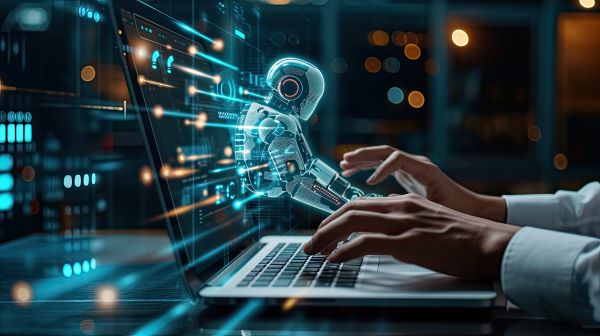AI is rapidly transforming software development by automating routine tasks, improving code quality, and enabling faster decision-making. But as AI evolves in exciting ways, it also raises important questions about the future of software development and the role of human developers. In this blog, we’re taking a closer look at how AI is being used, its key benefits, and the potential risks to keep in mind moving forward.
How Is AI Used in Software Development?
AI enhances efficiency and fosters innovation throughout the software development process. As developers incorporate cutting-edge tools and techniques, they can streamline workflows and deliver better results. Here are several key ways AI can drive productivity and quality in the field of software development.
Code Generation and Assistance
Generative AI tools are changing the way developers write code. They can streamline the process by suggesting and generating functions from natural language inputs to enable faster development with fewer errors.
-
Autocompletion: AI predicts the next lines of code, saving time and preventing mistakes.
Code synthesis: AI generates boilerplate code or full functions from brief descriptions, allowing developers to focus on higher-level tasks.
Bug Detection and Automated Debugging
AI-powered tools identify bugs and vulnerabilities early in the process, reducing the need for time-consuming manual debugging.
-
Error prediction: AI detects patterns to predict and avoid potential bugs.
-
Automated bug fixes: AI tools suggest or automatically apply fixes to identified issues.
Testing Automation
Developers can optimize testing processes by using AI to automatically generate test cases, prioritize tests, and reduce manual effort. This leads to more comprehensive coverage and quicker feedback, allowing teams to identify issues faster.
-
Test case generation: AI can produce tests based on user stories or existing code, expanding the testing scope.
-
Test optimization: AI refines tests to ensure efficiency and accuracy while reducing redundant testing.
Project Management and Resource Allocation
AI improves project planning by analyzing historical data, suggesting resource allocation strategies, and automating scheduling, budgeting, and task assignments. As a result, development teams can reap the benefits of smoother project execution and more accurate timelines.
-
Time and resource estimation: AI predicts timelines and allocates resources based on past projects.
-
Task automation: Project management tasks such as progress tracking and reporting can be automated, so developers can turn their efforts towards strategic work.
Security Enhancement
With security becoming a top concern in development, AI is helping safeguard code by identifying potential threats in real-time, continuously monitoring code for vulnerabilities.
-
Threat detection: AI identifies risks such as SQL injections or cross-site scripting (XSS).
-
Automated auditing: Teams can simplify security audits with AI tools, making sure code follows security best practices.
Refactoring and Optimization
AI-powered tools help developers refactor and optimize code, improving performance and maintainability while reducing technical debt.
-
Code review: Pinpoint and eliminate poor practices with AI-suggested optimization.
-
Performance tuning: AI identifies bottlenecks and recommends improvements for better performance.
Benefits of AI in Software Development
In this section, we’ll take a closer look at the advantages of generative AI in software development and see why it is an evolution well worth considering.
Automation of Repetitive Tasks
AI allows developers to automate routine tasks, such as code generation and bug detection, freeing up valuable time for more complex and creative aspects of development. In turn, this provides a valuable boost to productivity.
Higher-Quality Software
By identifying bugs and vulnerabilities early, AI helps improve the overall reliability of software. AI-powered testing tools can quickly find issues, run tests autonomously, and optimize code, leading to faster iterations and better-quality end products.
Accelerated Decision-Making and Planning
AI can analyze vast amounts of data, offering predictive insights that help with resource allocation, project timelines, and feature prioritization. Development teams can make more informed decisions, ultimately speeding up project completion and improving efficiency.
Empowering Non-Technical Users
Low-code and no-code AI platforms enable non-developers to create and customize software applications, democratizing the development process. This accessibility allows business professionals and stakeholders to participate in building solutions that meet their specific needs without requiring advanced coding skills.
Improved User Experience and Personalization
AI’s ability to analyze user data in real time allows for more personalized software experiences. By tailoring recommendations, features, and interfaces based on individual preferences, AI helps deliver software that is more engaging, intuitive, and user-friendly.
Considering the Potential Risks of Using AI for Software Development
AI offers transformative potential in software development, but like any powerful tool, it also brings certain risks that need to be managed carefully. If not addressed, these risks could affect both the development process and the final product.
Inherent Biases in AI Models
AI systems are only as unbiased as the data used to train them. If the training data contains biases, whether due to historical trends, demographic gaps, or flawed data, the AI can replicate or even exacerbate these biases. To prevent this, development teams must use diverse and inclusive training data, as well as actively test models for bias throughout their lifecycle.
The Risk of Becoming Overdependent on AI
Developers might become too dependent on AI-generated solutions, which could erode their core programming skills over time. Then, if AI tools fail or deliver suboptimal results, developers may struggle to manually intervene or troubleshoot effectively. AI should be seen as a collaborative tool rather than a crutch.
Introducing Security Weaknesses
While AI can help identify and fix bugs, it can also introduce new flaws that are difficult to detect. Rigorous manual code reviews, paired with automated security scans, are a must for any AI-generated code.
Opaque Decision-Making
Many AI models, especially deep learning systems, are often referred to as “black boxes,” meaning their decision-making processes can be difficult to understand. This lack of transparency poses challenges for debugging, refining, or explaining decisions made by the AI, which is especially concerning when AI is involved in mission-critical software. To address this, developers should opt for more interpretable models when possible and implement tools that provide greater insight into AI’s decision logic.
Job Shifts and Skills Gaps
AI’s automation of repetitive tasks, such as code generation or testing, could lead to shifts in the roles developers play. The key to navigating this transition is to ensure that developers and other tech professionals are reskilled for roles that focus on overseeing AI operations, improving AI algorithms, or working with AI to solve more complex problems.
Ethical Impacts and Social Responsibility
As AI becomes more integrated into development, it is critical that AI systems are used ethically. Developers and organizations must be proactive in prioritizing fairness, transparency, and accountability in AI applications.
Can AI Replace Software Developers?
AI is taking the software development world by storm, but it is unlikely to replace human developers anytime soon. While AI excels at certain tasks, human expertise is still essential to guide its output and align it with business goals. Instead of replacing developers, AI is reshaping their roles, enabling them to focus on innovation and more complex tasks.
For those concerned about the impact of AI on software development jobs, here are a few considerations to keep in mind:
-
AI is an assistive tool, not a full replacement. AI automates repetitive tasks, allowing developers to focus on more complex, strategic aspects of development. It complements human capabilities but does not eliminate the need for developers.
-
AI cannot replicate the human touch in creativity and innovation. AI tools can handle many tasks, but they lack the creativity, problem-solving, and strategic thinking that developers bring to the table. Human input is still crucial for aspects like business strategy, creative vision, and user experience.
-
AI is limited in its contextual understanding. Even advanced AI tools struggle with understanding the unique context of a team’s workflow or organizational needs. Developers are key in aligning AI-generated code with internal standards and project requirements.
Leverage AI Technology with a Balanced, Expert Approach
As AI continues to revolutionize the future of software development, partnering with experienced professionals can be an effective way to harness the full potential of these powerful tools. Whether you’re looking to integrate AI for code generation, testing, or project management, collaborating with experts equips you to implement AI strategies that support your business goals and development needs.
As always, feel free to contact us anytime—we’re always happy to help.
Ray



